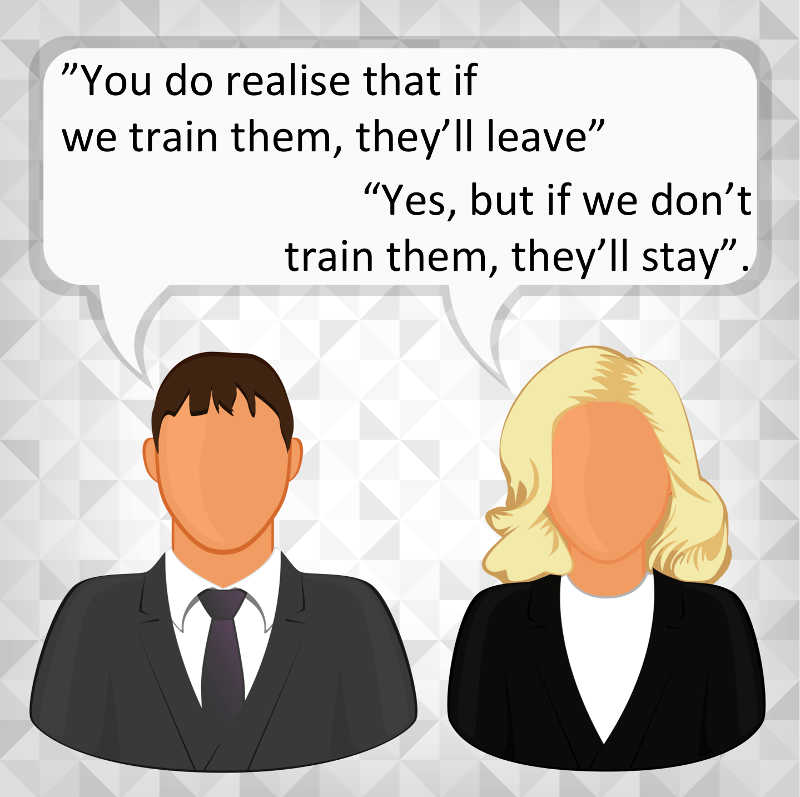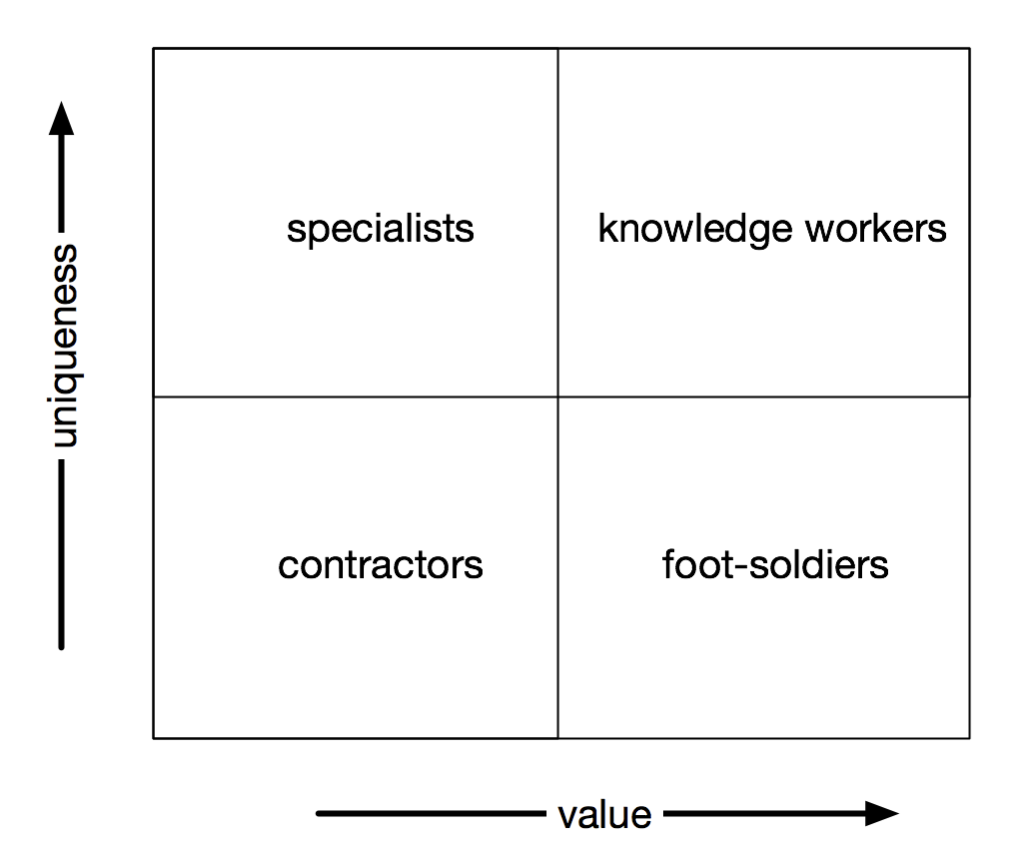One of several papers on training and development
Staff career development: what approach for managers?
Written by John Berry on 22nd September 2017. Revised 17th February 2025.
7 min read
 A career for most people is a fifty-year span over which they will be interested in working – when they’ll be economically active. But the patterns and nature of this work have changed and will change further in the coming decades. The decision about whether or not to train your people is less obvious. Your dilemma is well elaborated in the cartoon with two managers discussing this issue: “If we train them, they’ll leave (for a better job)”, says one. “But if we don’t, they’ll stay (because they can't get a better job)”, says the other.
A career for most people is a fifty-year span over which they will be interested in working – when they’ll be economically active. But the patterns and nature of this work have changed and will change further in the coming decades. The decision about whether or not to train your people is less obvious. Your dilemma is well elaborated in the cartoon with two managers discussing this issue: “If we train them, they’ll leave (for a better job)”, says one. “But if we don’t, they’ll stay (because they can't get a better job)”, says the other.
You have a clear decision to make and - as we’ll show in this article - that decision depends on the relationship your firm has with the worker.
Pre-2001
There was a day when each person joined a firm as an employee and stayed there for life – or at least for the period in which they were economically active. For most that’s no longer the case. Most people will have a mixed career. They will sometimes be employed, sometimes self-employed and sometimes even unemployed or volunteering. And many will change profession or trade mid-way though their working lives.
Given this profile of work, what should your role be as employer in staff development? What attitude should you have towards staff development?
In the days when the person stayed with the employer for a whole career, it was obvious. As markets changed, the employer would be obliged to train their employees to keep their skills and knowledge current, provide personal advancement and enhance job scope. Today, in such a mixed and fragmented employment environment the argument in favour of staff development is not so clear.
Truth about tenure
Tenure - the time for which a worker chooses to work for you - reflects the relationship you have with each worker type.
Firstly, managers’ disinclination to invest in people comes from a popular myth circulating in the press that employee tenure is dropping – that there’s increased inclination to seek new employment after a couple of years with a firm.
The claim that tenure is dropping is just not true. Recent reports that tenure for Gen Z staff is as low as two years is a myth. Or at least, lets clarify, employees want to stay in a healthy workplace - in a firm that values them. But they may not get the choice as firms prioritise profits over people.
Recent reports suggest that in the UK the average employee tenure with any one employer is still up around five years. The figure has been substantially static for the past 20 years and there is no real downward trend, and the fact that today's employees want to stay put is encouraging. So generally, people want to stay with you.
As manager, your attitude to development must therefore depend on the nature of your business, the value you place in your staff and their uniqueness – and not on myth.
Your attitude must depend on the contribution of different staff types to your competitive advantage – your ability to sell more and generate more profits than your competitors.

Knowledge workers
Firstly, if you employ what’s termed ‘knowledge workers’ you’ll want to bring them close to you, give them varied work and show them a career path. They’re both highly valued and unique in the labour market. Those staff are your algorithm developers, research chemists and design engineers who give the organisation the bulk of its competitive advantage through unique methods and other intellectual property. They are people that have specialist skills and knowledge and you will use them to secure your future.
For those knowledge workers, you’ll want to given them ever increasing work scope and complexity. Your role in managing them is simple. You’ll want to intensify their knowledge, grow their skills and encourage them to gain greater experience of all aspects of your firm. They need comprehensive development plans, career coaching and perhaps funded academic studies. You’ll want to invest and they’ll expect that.
And if you’re an SME, you’ll need to provide them with the trappings of a promotion system – perhaps based on professional registration.
Footsoldiers
Secondly, if you employ staff that are not unique in the employment market, but are key to your future – or at least key at this point in time – you’ll want to build a sound relationship. These are your foot soldiers – your bookkeepers, claims handlers and mechanics.
The relationship with foot soldiers has to be good for both parties. That doesn’t mean investing in their future, but investing to exploit them – and they you. They’ll want deepened and broadened experience in your firm in readiness for their next job. They are the employees with shortest tenure.
You’ll hire or acquire the services of this group when it’s needed. Your role is to understand their needs and make opportunities for both parties for as long as they are with you.
Peripheral specialists
Thirdly, there’s a group of non-permanent staff that are unique in the labour market but are not key to your future. They are perhaps in peripheral specialist roles like legal counsel, market sector advisers and subject matter experts. You need their skills and knowledge for what it is today and you need to build an alliance with them.
This group will likely be part-time and employed by or contracting to others too. They don’t expect you to invest in them – they’ll do that themselves. They need to know the high value you place in them and that the relationship will endure over many years. Your role is to pay them well and allow them to expand their contribution.
Contractors
And fourthly, if you employ contractors or agency workers, you will engage them for the skills and knowledge they bring. You shouldn’t expect to invest and will simply terminate one contractor and hire another if the skills and knowledge fall short. This extends to anyone who provides their services through an intermediary, even if that intermediary is their own firm. It includes osteopaths, personal trainers, IT technicians and software coders.
Your role is to pay them well such that they can take time off to maintain their continuous personal development. Because they will not be growing with your firm and their tenure will be more volatile, you must control, standardise and secure their work through dictated methods.
Finally, you will of course need to bring all skills and knowledge of all workers in line with the technology that they use. You have no option – failure to train on company processes and tools will degrade KPIs like quality and productivity.
Summary
This overview suggests one thing – that your role in personal development of your staff should not be homogenous. It should vary depending on the nature of the worker’s uniqueness in the labour market and their value to you.
- You should manage and fund development of your unique, high value staff who give the firm its competitive advantage.
- You should provide opportunity to your foot-soldiers who are not unique but you should invest only to allow access to your systems and sustain KPIs.
- You should build long-term relationships with those who are somewhat peripheral to the mainstream of the business but who are highly unique in the labour market. They will develop themselves.
- And you should buy in routine services from those workers of low value to you and with common skills in the labour market.
We can help you set up an organisation-wide development system encompassing all your staff of all types. If you’d like to talk about this and identify those groups in more detail, call us now.